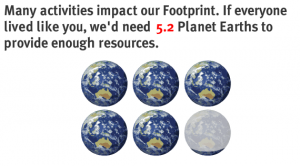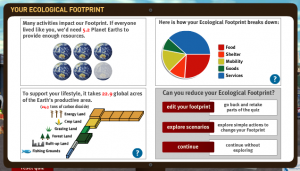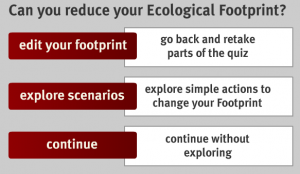As the consequences of highly consumptive capitalism continue to cause problems around the  world, teaching about the impacts of our consumption is an increasing necessity in every classroom. One of the best ways I have found to demonstrate the structure/agency dynamic to students is to have them calculate their ecological footprint.
world, teaching about the impacts of our consumption is an increasing necessity in every classroom. One of the best ways I have found to demonstrate the structure/agency dynamic to students is to have them calculate their ecological footprint.
Formulated by Dr. Mathis Wackernagel and his team at the Global Footprint Network, this interactive online tool allows individuals to enter specific practices of their individual consumption such as: the quantity of meat in their diet, the proximity of the sources of their food, the amount of trash they generate, frequency of purchasing clothing and household goods, size of residence, and modes of transportation. There are two options for reporting individual characteristics and I require my students to do the more specific reporting method.
individual consumption such as: the quantity of meat in their diet, the proximity of the sources of their food, the amount of trash they generate, frequency of purchasing clothing and household goods, size of residence, and modes of transportation. There are two options for reporting individual characteristics and I require my students to do the more specific reporting method.
Upon completing the dozen or so questions, the website calculates the number of planets it would  take for the individual’s consumption to be aligned with the generative bio-capacity of the earth. For Americans this is almost always in the range of 5 or 6 planets and of course we only have one.
take for the individual’s consumption to be aligned with the generative bio-capacity of the earth. For Americans this is almost always in the range of 5 or 6 planets and of course we only have one.

Additional tools allow for the exploration of reducing your overall footprint.
As usual, I try to utilize resources in the classroom that have an explanation of their methods and data. This one is no exception as it contains both a brief summary and much more extensive documents. Click here to check out their methods section.In case students doubt that humanity is consuming the earth faster than it can produce new resources or filter our waste, the site also publishes a free Living Planet Report that can be downloaded or viewed dynamically online.
Academic articles that are related to or use the ecological footprint include (click on titles for links):
“Footprints on the Earth: The Environmental Consequences of Modernity” by Richard York, Eugene A. Rosa and Thomas Dietz
“Consumption and Environmental Degradation: A Cross-National Analysis of the Ecological Footprint” by Andrew K. Jorgenson
“Driving the human ecological footprint” by Thomas Dietz, Eugene Rosa, and Richard York
“Societies consuming nature: A panel study of the ecological footprints of nations, 1960–2003” by Andrew K. Jorgenson, Brett Clark
Take the quiz and see how big your ecological footprint is.

Comments